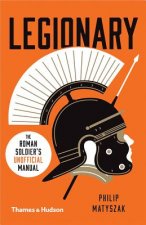
Code: 04451792
Roman Republican Legionary 298-105 BC
by Nic Fields
Soon after the Caudine Forks fiasco, where Roman citizens had suffered the humiliation of being forced to pass under the yoke, an act symbolising their loss of warrior status, the tactical formation adopted by the Roman army under ... more
- Language:
 English
English - Binding: Paperback
- Number of pages: 64
Publisher: Bloomsbury Publishing, 2012
- More about this

78.03 zł
RRP: 91.75 zł
You save 13.73 zł
Availability:
50/50 We think title might be available. Upon your order we will do our best to get it within 6 weeks.
We think title might be available. Upon your order we will do our best to get it within 6 weeks.We search the world
You might also like
-

Imperial Roman Warships 193-565 AD
56.55 zł -23 % -

Weapons of the Viking Warrior
74.90 zł -23 % -

Artisanal Kitchen: Jewish Holiday Baking
49.49 zł -19 % -

Ancient Greek, Roman & Byzantine Costume
65.63 zł -4 % -

Roman Army Units in the Eastern Provinces (1)
61.19 zł -23 % -

Romano-Byzantine Armies 4th-9th Centuries
67.64 zł -15 % -

Roman Legionary
99.30 zł -

Composite Bow
83.17 zł -14 % -

Roman Legionary 109-58 BC
70.47 zł -23 % -

Roman Legionary vs Carthaginian Warrior
82.97 zł -14 % -

German Jet Aces of World War 2
88.11 zł -14 % -

Legionary
47.38 zł -23 % -

Gladius
74.90 zł -23 % -

Roman Legionary AD 69-161
78.03 zł -14 % -

Roman Centurions 31 BC-AD 500
56.65 zł -23 % -

Jewish Revolt AD 66-74
74.90 zł -23 % -

Roman Standards & Standard-Bearers (1)
70.47 zł -23 % -

Katana
83.17 zł -14 % -

Pilum
83.17 zł -14 % -

Cowpens 1781
107.77 zł -11 % -

Armies of the Germanic Peoples, 200 BC to AD 500
93.25 zł -23 %
Give this book as a present today
- Order book and choose Gift Order.
- We will send you book gift voucher at once. You can give it out to anyone.
- Book will be send to donee, nothing more to care about.
Availability alert
Enter your e-mail address and once book will be available,
we will send you a message. It's that simple.
More about Roman Republican Legionary 298-105 BC
You get 45 loyalty points
 Book synopsis
Book synopsis
Soon after the Caudine Forks fiasco, where Roman citizens had suffered the humiliation of being forced to pass under the yoke, an act symbolising their loss of warrior status, the tactical formation adopted by the Roman army underwent a radical change. Introduced as part of the Servian reforms, the legion had originally operated as a Greek-style phalanx, a densely packed block of citizens wealthy enough to outfit themselves with the full panoply of an armoured spearman or hoplite. The function of a hoplite had been the privilege only of those who owned a certain amount of property, poorer citizens serving either as auxiliaries or as servants. Now, however, the Romans adopted the manipular system, whereby the legion was split into distinct battle lines, each consisting of tactical subunits, the maniples. In contrast to the one solid block of the phalanx, the legion was now divided into several small blocks, with spaces between them. The Romans, in other words, gave the phalanx 'joints' in order to secure flexibility, and what is more, each soldier, or legionary, had twice as much elbow room for individual action, which now involved swordplay instead of spear work.Even though still a citizen militia recruited from property owners supplying their own war gear, it was the manipular legion that faced Pyrrhus and his elephants, the Gauls and their long swords, Hannibal and his tactical genius, the Macedonians and their pikes, to name but a few of its formidable opponents. This book, therefore, will look at the recruitment (now based on age and experience as well as on wealth and status), training (now the responsibility of the state as opposed to the individual), weapons (new types being introduced, both native and foreign), equipment (ditto) and experiences (which included submission to a draconian regime of military discipline) of the legionary at the epoch of the middle Republic. The middle Republican era opens with the last great war with the Samnites (Third Samnite War, 298-290 BC) and closes with the Republic at the height of its imperial glory after the victory in North Africa (Iugurthine War 112-105 BC). The provisional legion in which the legionary served now exhibited many of the institutions and customs of the later professional legions, perhaps best reflected in one of its most notable practices, the construction of a temporary camp at the end of each day's march. Lest we forget, however, for our legionary, military service was not a career, but an obligation he owed to the state, and it was this militia army that conquered the peninsula of Italy, defeated the magnificent Hellenistic kingdoms and the mercantile empire of Carthage. All of the Mediterranean basin was now within the imperium of Rome, some of it organized into provinces governed by Roman magistrates, the rest reduced to client status. Romans were acquiring a sense that they possessed a world empire.
 Book details
Book details
Book category Books in English Humanities History History: earliest times to present day
78.03 zł
- Full title: Roman Republican Legionary 298-105 BC
- Author: Nic Fields
- Language:
 English
English - Binding: Paperback
- Number of pages: 64
- EAN: 9781849087810
- ISBN: 1849087814
- ID: 04451792
- Publisher: Bloomsbury Publishing
- Weight: 230 g
- Dimensions: 247 × 187 × 4 mm
- Date of publishing: 20. April 2012
Trending among others
-

Learn to Read Ancient Sumerian
152.24 zł -

Russian Journal
61.29 zł -23 % -

King's Two Bodies
125.72 zł -4 % -

Heart of Europe
103.64 zł -9 % -

Armies of Castile and Aragon 1370-1516
67.64 zł -15 % -

One Hell of a Gamble
133.68 zł -5 % -

Rise and Fall of Ancient Egypt
79.54 zł -23 % -

Guns, Germs, and Steel
48.59 zł -5 % -

The Origins of Totalitarianism
47.08 zł -14 % -

Illustrated Encyclopedia of Uniforms of World War I
93.25 zł -23 % -

The Art of Combat
143.97 zł -

On Tyranny
37.80 zł -26 % -

Homo Ludens
54.34 zł -

Tuesdays With Morrie
48.99 zł -14 % -

History of the Decline and Fall of the Roman Empire
61.19 zł -23 % -

King Leopold's Ghost
52.02 zł -23 % -

Meditations
45.56 zł -4 % -

Streams of Gold, Rivers of Blood
152.24 zł -

Travels of Ibn Battutah
52.02 zł -23 % -

Augustus
70.47 zł -23 % -

Age Of Capital
70.47 zł -23 % -

Egyptian Book of the Dead: The Book of Going Forth by Day : The Complete Papyrus of Ani Featuring Integrated Text and Full-Color Images (History ... M
125.42 zł -23 % -

Deng Xiaoping and the Transformation of China
125.72 zł -5 % -

Age Of Extremes
79.04 zł -14 % -

John Skylitzes: A Synopsis of Byzantine History, 811-1057
169.88 zł -5 % -

Arms and Armour of Late Medieval Europe
47.38 zł -23 % -

Alexander the Great
85.89 zł -4 % -

End of Days
41.53 zł -5 % -

Shake Hands With The Devil
61.29 zł -15 % -

Complete Roman Army
93.25 zł -23 % -

Distant Mirror
61.29 zł -23 % -

Fall of the Roman Empire
93.66 zł -5 % -

Fifties
93.76 zł -5 % -

After the Ice
79.74 zł -23 % -

Histories
28.02 zł -3 % -

Savage Continent
70.47 zł -23 % -

Oxford IB Diploma Programme: The Cold War: Superpower Tensions and Rivalries Course Companion
224.73 zł -

Age Of Empire
70.47 zł -23 % -

Pompeii
51.91 zł -23 % -

Life in a Cave
27.11 zł -15 % -

Oxford Illustrated History of Prehistoric Europe
169.07 zł -9 % -

On the Ocean
185 zł -

Flowers of Battle The Complete Martial Works of Fiore dei Liberi Vol 1
599.80 zł -

On Ancient Warfare
116.34 zł -23 % -

Access to History for the IB Diploma: Causes and effects of 20th-century wars Second Edition
133.68 zł -15 % -

Safe Area Gorazde
88.82 zł -23 % -

Yoga Body
85.69 zł -5 % -

Fear and Loathing on the Campaign Trail '72
61.29 zł -23 % -

Fall of Carthage
70.47 zł -23 %
safisfied customers
Since 2008, we have served long line of book lovers, but each of them was always on the first place.
Copyright! ©2008-24 libristo.pl All rights reservedPrivacyPoučení o cookies


 21 million books
21 million books Delivery 12.99 zł
Delivery 12.99 zł (32) 444 93 66 (8-15.30h)
(32) 444 93 66 (8-15.30h)